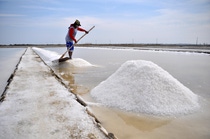미디어
BASF plastic additives help to boost salt production in Indonesia
- Plastic additives help to make salt production process faster while improving quality
- Protect geomembranes from harmful effects of UV radiation, high temperatures and environmental pollutants
Hong Kong – March 9, 2017 – BASF’s plastic additive Chimassorb® 2020, together with an antioxidants package, has been used by PT Kencana Tiara Gemilang (KTG), a leading plastic sheet manufacturer in Indonesia, to make high density polyethylene (HDPE) geomembranes for salt ponds in Indonesia. The additive provides durability to the geomembranes by preventing degradation from UV rays, thermal stress and oxidation.
“We believe in the power of innovation and in pushing boundaries to find new applications for our products,” says Hermann Althoff, Senior Vice President, Plastics Additives Asia Pacific. “Through our collaboration with KTG, we can contribute to increasing productivity and efficiency of the national salt industry and make it more competitive.”
HDPE geomembranes provide an impermeable barrier against a wide range of solids and liquids. These are versatile and useful compounds, but they do have a common weakness; UV radiation, which leads to the generation of free radicals, a major cause of geomembrane degradation. Temperature extremes and duration of use can also weaken the material.
To make the geomembrane resistant to intense sunlight, a light stabilizer such as Chimassorb 2020 is added to the polymer during manufacturing. It protects the plastic against its worst enemy by capturing the harmful radicals and thus protecting the material against damage from the sun's intense UV radiation. The light stabilizer, together with the antioxidant package, also help to fulfil the Geosynthetic Research Institute (GRI) requirements for geomembranes, which sets forth a set of minimum, physical, mechanical and chemical properties that must be met, or exceeded, by the geomembrane being manufactured.
During the manufacture of geomembranes, Chimassorb 2020 helps to lower the tendency to melt fracture, making it suitable for highly demanding processing conditions involving high shear rates. Better melt flow control reduces die build-up, optimizes filter pressure and allows longer running times, resulting in more stable processing and reduced maintenance costs.
Shorter production time with better quality
Indonesia has the second-longest coastline in the world after Canada, stretching over 54,000 kilometers yet a majority of the salt it consumes is still imported.
In the conventional method, farmers pump sea water through a channel into the salt pond. After 25-28 days of evaporation, the salt crystals are transferred to a salt table for drying, which takes about 4-10 days, depending on the weather conditions. With this method, the farmer could produce and harvest salt three times a year.
Salt ponds with geomembrane technology are currently being promoted by the Indonesian government as the way to achieve self-sufficiency in terms of salt production. With HDPE geomembranes, the evaporation process is reduced from 25 days by the conventional system to 14 days. The lifetime of HDPE geomembranes of more than 10 years adds to the benefits. Using the prisma system, the quality of salt is improved (contamination by subsoil can be avoided) and it can be harvested anytime.
About BASF Plastic Additives
BASF is a leading supplier, manufacturer and innovation partner of plastic additives. Its comprehensive and innovative product portfolio includes stabilizers which provide ease in processing, heat and light resistance to a variety of polymers and applications including molded articles, films, fibers, sheets and extruded profiles.
More information about plastic additives: www.plasticadditives.basf.com
About BASF
At BASF, we create chemistry for a sustainable future. We combine economic success with environmental protection and social responsibility. The approximately 114,000 employees in the BASF Group work on contributing to the success of our customers in nearly all sectors and almost every country in the world. Our portfolio is organized into five segments: Chemicals, Performance Products, Functional Materials & Solutions, Agricultural Solutions and Oil & Gas. BASF generated sales of about €58 billion in 2016. BASF shares are traded on the stock exchanges in Frankfurt (BAS), London (BFA) and Zurich (BAS). Further information at www.basf.com.

